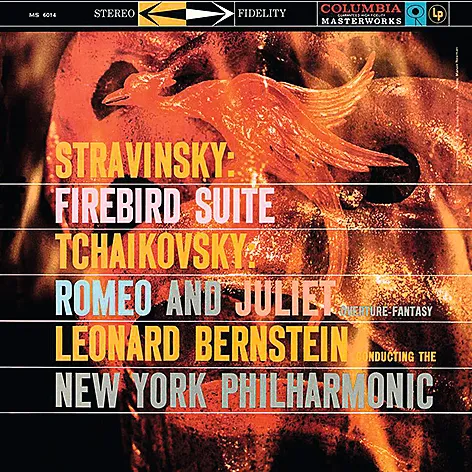The best recording of Tchaikovsky's Romeo and Juliet
Leonard Bernstein (conductor)
New York Philharmonic
Sony Classical G010003710793V

There is no point pretending that Shakespeare’s Romeo and Juliet is not the greatest love story ever told – and more than ever, given the glut of recordings, Tchaikovsky’s fantasy-overture needs to sound like it. Leonard Bernstein and the New York Philharmonic, performing in 1957 – the same year Bernstein’s West Side Story was premiered on Broadway – bring the piece to life with such searing emotional impact that it really is like hearing it for the first time. This is the earliest of Bernstein’s three recordings and is the only one of them I’d recommend. His other version with the New York Phil, from 1989, is less edgy, plus a bit too soupy in the love music; and the live performance with the Israel Philharmonic from 1978 sounds lumpenly heavy-handed.
The atmosphere here is powerfully wrought from the outset and the characterisation of the themes is second to none. Bernstein creates immense tension in the build-ups and, best of all, the fight scenes are absolutely ferocious: here the knives are most definitely out and there are casualties. In the love theme, we can relish supple, flexible rubatos and eloquent articulation, as well as the occasional portamento that either is your thing or is not, but is very much mine. But just listen to the transition to the fight music afterwards. This passage is sometimes a casualty of those conductors who lose sight of their storytelling, but Bernstein ups the energy straight away: if the rival gangs are planning the ‘rumble’, it’s going to be fearsome. And so it is – before carrying us through to the second eruption of the love music, which is quite different from the first and suitably devastating in its effect.
The New York Philharmonic’s playing is actually not 100 per cent perfect, but most of it, especially the violins and trumpets, is hot enough to melt your hi-fi equipment. The recorded sound, though remastered, affects the woodwind tone slightly, but that doesn’t stop the warmth, drama, colour and sheer thrilling immediacy from sweeping all before it.
The conductor who composed his own version of Shakespeare’s tragedy in West Side Story doesn’t hold back for one moment; that huge purple thing on his sleeve is indeed his heart. But why bother with Romeo and Juliet if you don’t want strong emotions? Faced with the intensity and all-out passion of this magnificent account, there is only one thing I feel I can do – and that’s surrender.
Three other great recordings of Tchaikovsky's Romeo and Juliet
Guido Cantelli (conductor)
Philharmonia Orchestra
Warner Classics 9029538303
The fiery young Italian conductor Guido Cantelli recorded the overture with the Philharmonia in 1951, five years before his untimely death in a plane crash. This is one of the most inspiring versions of all, filled with freshness, wonder, dynamism, colour and strong attention to detail: the orchestra plays for him as if possessed. Cantelli even presents the final bars as written. Fortunately, the recording has been remastered, improving the ropey sound of the original, and has been re-released to mark the conductor’s centenary.
A guide to Tchaikovsky's The Nutcracker
Iván Fischer (conductor)
Budapest Festival Orchestra
Channel Classics CCSSA21704
A truly Shakespearean eloquence and expert narrative pacing are prime in this fascinating 2004 account from the Budapest Festival Orchestra under Iván Fischer. The introduction is filled with foreboding that casts perspective across all the rest.
- Six of the best musical settings of Shakespeare's Romeo and Juliet
- Swan Lake: the story behind Tchaikovsky's great ballet score
The fight episodes are not as terrifying as Bernstein’s, but make sense within Fischer’s broad envelope of looming tragedy and lyrical compassion. The love music is articulated as if reciting lines of poetry; and the orchestral playing is supple, streamlined, clear-textured and powerful. Sound quality is excellent.
The best recordings of Prokofiev's Piano Concertos
Mikhail Pletnev (conductor)
Russian National Orchestra
DG E477 0532
Also from 2004, Pletnev conducts the Russian National Orchestra in a convincing and seductive account, with superb recorded sound. Unlike so many lead-weighted recordings, it feels positively airborne. There’s a sparkle and precision to the first fight episode that is one step away from Tchaikovsky’s ballet music, and the love theme is shimmering and sensual. The drama is splendidly paced and gathers drive where it needs to – as it can only when an expert conductor and virtuoso orchestra are as attuned to each other as this.
Nine unexpected uses of Tchaikovsky's The Nutcracker
And one to avoid…
Sergiu Celibidache (conductor)
RAI Turin
Tchaikovsky’s overture can reasonably last anything from around 18 to 21 minutes without putting you to sleep, but Sergiu Celibidache’s 1960 recording with the RAI Turin somehow takes 25. The cellos’ entry in the introduction sounds as if a pause has been inserted over each note and some ropey intonation in the woodwind suggest that the poor chaps are running out of breath. If there is a suitable justification for this approach, I haven’t yet found it.
The best recordings of Tchaikovsky's 1812 Overture
Here are the best music streaming services on offer
Words by Jessica Duchen. This article appeared in the July 2020 issue of BBC Music Magazine.
